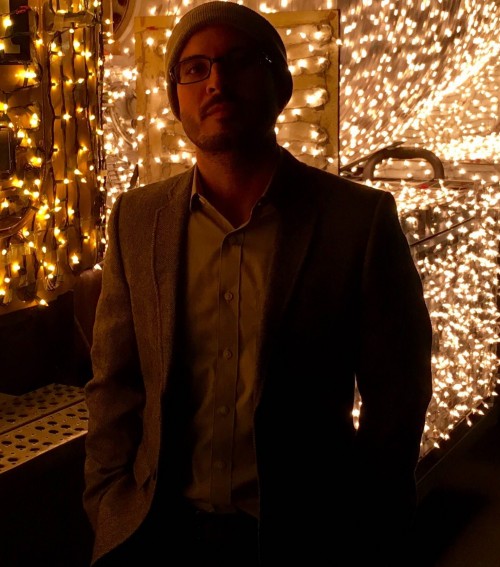A little Ken Kesey, a little Kurt Vonnegut, a little Richard Brautigan, Scott McClanahan would probably scoff at the literary label. His books are mostly easy reads. His clipped sentences breeze right by. The intimacy of his voice is a lullaby. —Jason Lucarelli
The Sarah Book
Scott McClanahan
New York Tyrant, 2017
150 pages; $15.00
.
Scott McClanahan’s latest novel The Sarah Book has been forthcoming since as early as 2011. It’s been called “the Chinese Democracy of indie lit,” and the cover is ripped straight from Guns N’ Roses’s Use Your Illusion II, while lyrics from Use Your Illusion I’s “November Rain” appear in the book. The final product is a “continuation of the semi-autobiographical portrait he’s been writing over the years about his life in West Virginia.” This portrait spans McClanahan’s previous books: Stories (2008, Six Gallery Press), Stories II (2009, Six Gallery Press), Stories V! (2011, Holler Presents), The Collected Works of Scott McClanahan Vol. 1 (2012, Lazy Fascist Press), Crapalachia (2013, Two Dollar Radio), and Hill William (2013, Tyrant Books). Many of these books were dedicated to his real-life wife Sarah. Now, The Sarah Book explores the breakup of his marriage to Sarah in the fiction-blends-fact format of his previous literary efforts.
A little Ken Kesey, a little Kurt Vonnegut, a little Richard Brautigan, Scott McClanahan would probably scoff at the literary label. His books are mostly easy reads. His clipped sentences breeze right by. The intimacy of his voice is a lullaby. (Listen to him read.) There’s no shaking his charming blend of comedy and tragedy. His simplicity is a spell. “I’m looking for little surprises,” he says in an interview at Oxford American. “I’m much more interested in amateurism than professionalism. Prose needs to get sloppy again and then maybe we can find something useful.”
Oxford American has called Scott McClanahan “one of the most unrestrained writers of our time.” Author Sam Pink says, “He writes in a way that is conscious of both his own absurdity and that of others, without overdoing either.” To corroborate these claims, here’s a passage from The Sarah Book:
The first time I met Sarah Johnson she told me I was going to shrink my penis.
She was wearing a black turtleneck and tights with a black skirt and black boots that came up to her knees. She looked like a cartoon character and she had big-big, big-big, big brown eyes. Her nose was small and her mouth was tiny like a dot. The dot turned down in the corner like a frown, but fuck descriptions.
I drank my Mountain Dew and she said, “You know that has yellow 5 in it? It’s been known to shrink penises.”
I took a chug from a big bottle and said, “That’s why I’m drinking it. Need to take a few inches off.”
She laughed like this: Say, O my god. O my god. Then say it for a million times.
It’s slightly sophomoric, but this seemingly careless flow of comedy is tinged with a poetic sensibility that perfectly captures Scott McClanahan’s prose style.
The Sarah Book is full of passages like this one, and it’s also full of a sense of loss that’s traceable through—what else?—word patterns. The dominant pattern begins in the isolated opening paragraph:
There is only one thing I know about life. If you live long enough you start losing things. Things get stolen from you: First you lose your youth, and then your parents, and then you lose your friends, and finally you end up losing yourself.
This passage foretells the entire novel, and repeated references to the pattern reinforce this feeling of losing, having lost, being gone.
The novel opens on narrator Scott grappling with anger, alcoholism, and depression in the manner of narrators from other of McClanahan’s fictions. There’s little indication for why this particular narrator is the way he is, and because the novel is told through the first person perspective, we’re left with the limited awareness of a narrator whose bad behavior precedes his marital woes. He drives drunk with his kids in the car, burns a Bible, energetically calls up 6.66 with Taco Bell orders, and destroys his porn-browsing history by sledge-hammering his computer and destroying his wife’s archive of baby photos in the process. After Sarah demands a divorce, he moves into the Walmart parking lot, tries killing himself with Tylenol and Pepto Bismol, sells his wedding ring for 250 dollars, and visits a strip club where he pays for a lap dance from a former student. The entire novel is a series of missteps that lead only to more missteps.
Inside the story of how Scott lost Sarah is how Scott met Sarah. Between all of the debauchery (narrator Scott even celebrates a “Day of Debauchery”) and self-inflicted wounding are continuations of the “lost” pattern from the novel’s opening:
As I drove through the mountains, I wonder if I knew I would marry Sarah ten years later and we’d raise children together in the house I just left. I wonder if I knew that one day I’d be writing about how we met and how we only love what we lose.
The reminiscent narrator bridges the past and the present through memories at the level of the paragraph and word associations at the level of the sentence. Here’s a variation of the pattern in a scene after Scott and Sarah attend a co-parenting class in preparation of their divorce:
I saw Sarah’s black Honda CRV. I saw Sarah inside. She had her hands to her face. And she was just sitting in her car and she was weeping. She was wiping away the tears from her face with a wadded up handkerchief and she was trying to stop crying, but still she sobbed. I saw that she wasn’t a rock. She was just a person who I had loved and now she was gone. I was gone too.
In another scene, after moving into an apartment with his friend Chris who is also going through a divorce, Scott discovers baby kittens beside the parking lot dumpster. Scott heads to the grocery store for food to feed the hungry baby kittens, but on the way home Scott accidentally runs over one of the kittens. He vows to bury the kitten when he returns home from work, but he returns to find that the garbage truck has run over the kitten again:
I made it a new monument that evening. A true one. When I came home again the next evening I whipped the wheel wide and I ran over the kitten lump. The next morning I backed up and watched the dumpster grow larger. I ran over this death. The morning after that I came back home and ran it over again. Then the next day I ran over it once more and I knew if I ran over it enough then maybe one day it would all be gone.
You could say there’s some symbolism here for the loss of his wife, his marriage, his family, even himself, or you could lay every instance of the pattern out in front of you, follow the connections, and feel that sense of loss for yourself. The pattern balances the tragic and the comedic, and when McClanahan’s writing is at its best, either emotion is never far behind the other.
The novel is mostly a series of memories from before, during, and after Scott’s his divorce to Sarah. At the end of the novel, during a dinner with Sarah, his kids, his new girlfriend Julia, and Sarah’s new boyfriend, the narrator has a sense of looking back, as if he’s beyond this moment in the life of his strange new family, as if all of life’s emotions are only a series of moments. The Sarah Book is the often-told story of a man who lost it all and finally loses himself on his way to becoming someone else.
In the same interview from Oxford American, McClanahan says, “This writing stuff has actually helped me to lose everything I ever cared about. I lost a family over the amount of time I’ve spent on it. It’s some weird graphomania I can’t stop. I wish a doctor could cure me. My books are my demons and I want to be rid of them.” If his books are our demons, in our hands his books are a reflection of how cruel we can be to each other and ourselves. But sometimes it takes a little cruelty to get away.
—Jason Lucarelli
N5
Jason Lucarelli is a graduate of the MFA in Creative Writing program at the Vermont College of Fine Arts. His work has appeared in Numéro Cinq, The Literarian, 3:AM Magazine, Litro, Squawk Back, and NANO Fiction.
.
.


